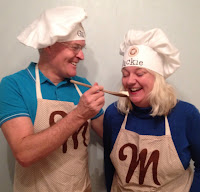The opening of any shop is big news for those involved. The opening of Weymouth Sainsbury’s is big news not only for the 300 staff it’s just hired but also for the entire town.
A new supermarket brings more choice and also more competition. That’s good for consumers but what about existing local businesses, some of which may feel threatened by the arrival of another national brand.
Bizoh spoke to Steve Jones, store manager to find out more.
Let’s get some facts out of the way. The store opens on 16 October 2013. It’s 46,000 sq ft (if you can visualise what that looks like) with 520 car parking spaces and a café upstairs. The store is designed to be easy on the environment.
The filling station canopy will trap energy from the sun and use it to supply electricity. The store has over 70 rooflights to gain maximum natural illumination. All the internal lighting uses LEDs and a highly sensitive monitoring system turns these up or down depending on the amount of natural light available.
Sainsbury's and local business
This is manager Steve’s second new store and he’s familiar with the concerns of other local traders. In his previous store, he invited a worried local newsagent to sell some of their own products in the store foyer, and from this, a monthly community market developed.
Steve wants to “co-exist harmoniously” with his neighbours. He’s arranged for teams coming in to set up the store to stay in local guesthouses rather than the bigger hotels. Sainsbury’s have sponsored a local rugby team. He’s met with the organisers of Weymouth Foodbank and many other local groups.
The Sainsbury’s team has performed makeovers at local venues and together chosen to support a local charity. They’ve certainly worked hard to win friends in the area. Steve says his door is always open to any local business wanting to discuss concerns or ideas.
A boost to the Weymouth and Portland economy
The arrival of Sainsbury’s is already delivering some benefits to Weymouth. Almost all of the 300 staff have been recruited from nearby, including 18 of the 20 team leaders. There’s scope for others to join them once the store opens and the home delivery network builds up.
Local young people could find themselves a job for life at Sainsbury’s. Steve himself joined as a trainee butcher at 18 and he’s now managing his seventh store.
Local firms always worry when competitors, particularly big hitters like Sainsbury’s, turn up in town. But competition and change are part of business. The biggest beneficiary of the new store’s arrival will be, we trust, the local economy of Weymouth and Portland.



























